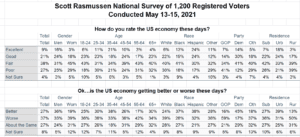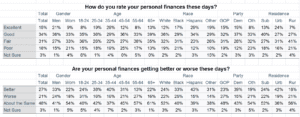Twenty-seven percent (27%) of voters nationwide say their own personal finances are getting better. A Scott Rasmussen national survey found that 21% take the opposite view, saying their finances are getting worse. Those figures are virtually identical to the results from last month and the month before.
Forty-nine percent (49%) of voters rate their own finances as good or excellent while 18% say poor. Those figures are also little changed from recent months.
This stability suggests that last months weak jobs report released earlier this month has had little immediate impact on perceptions of personal finances.
However, the report may have damaged perceptions of the overall economy. Just 27% now believe the economy is getting better while 37% say it’s getting worse. Last month, those numbers were essentially even (34% better/ 35% worse).
Thirty-percent (30%) now rate the U.S. economy as good or excellent while another 27% say poor. Last month, 32% rated the economy as good or excellent while 24% said poor.
Urban voters are more optimistic about economic trends than suburban and rural voters. Democrats are far more optimistic than Republicans and Independents.
SIGN UP to receive Scott’s free email newsletter.
CHECK OUT Scott’s latest polls.
Note: Neither Scott Rasmussen, ScottRasmussen.com, nor RMG Research, Inc. have any affiliation with Rasmussen Reports. While Scott Rasmussen founded that firm, he left more than seven years ago and has had no involvement since that time.
Methodology
The online survey of 1,000 Registered Voters was conducted by Scott Rasmussen from May 13-15, 2021. Field work for the survey was conducted by RMG Research, Inc. Respondents were selected from a list of Registered Voters and through a process of Random Digital Engagement. Certain quotas were applied, and the sample was lightly weighted by geography, gender, age, race, education, internet usage, and political party to reasonably reflect the nation’s population of Registered Voters. Other variables were reviewed to ensure that the final sample is representative of that population.



